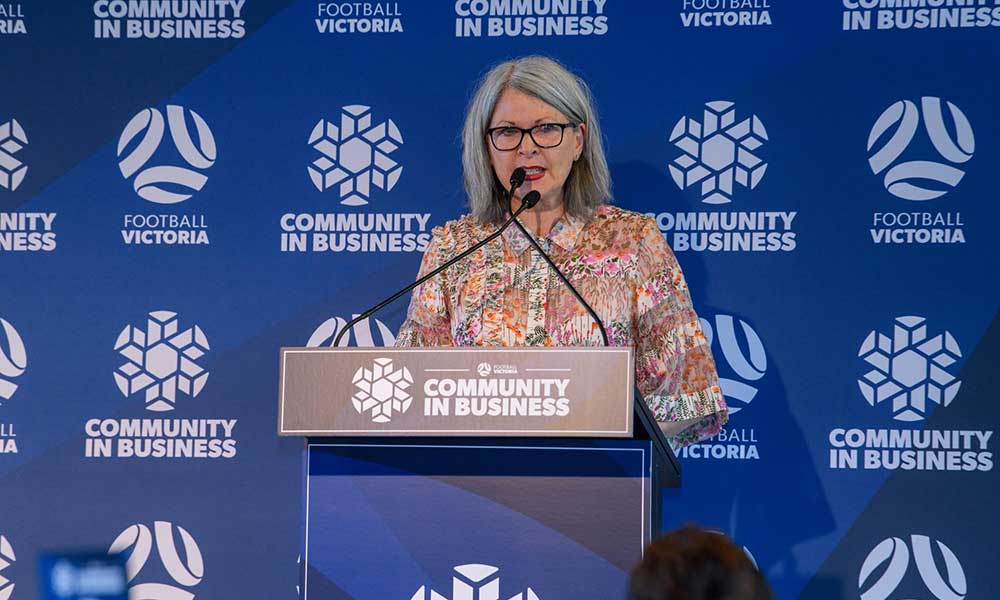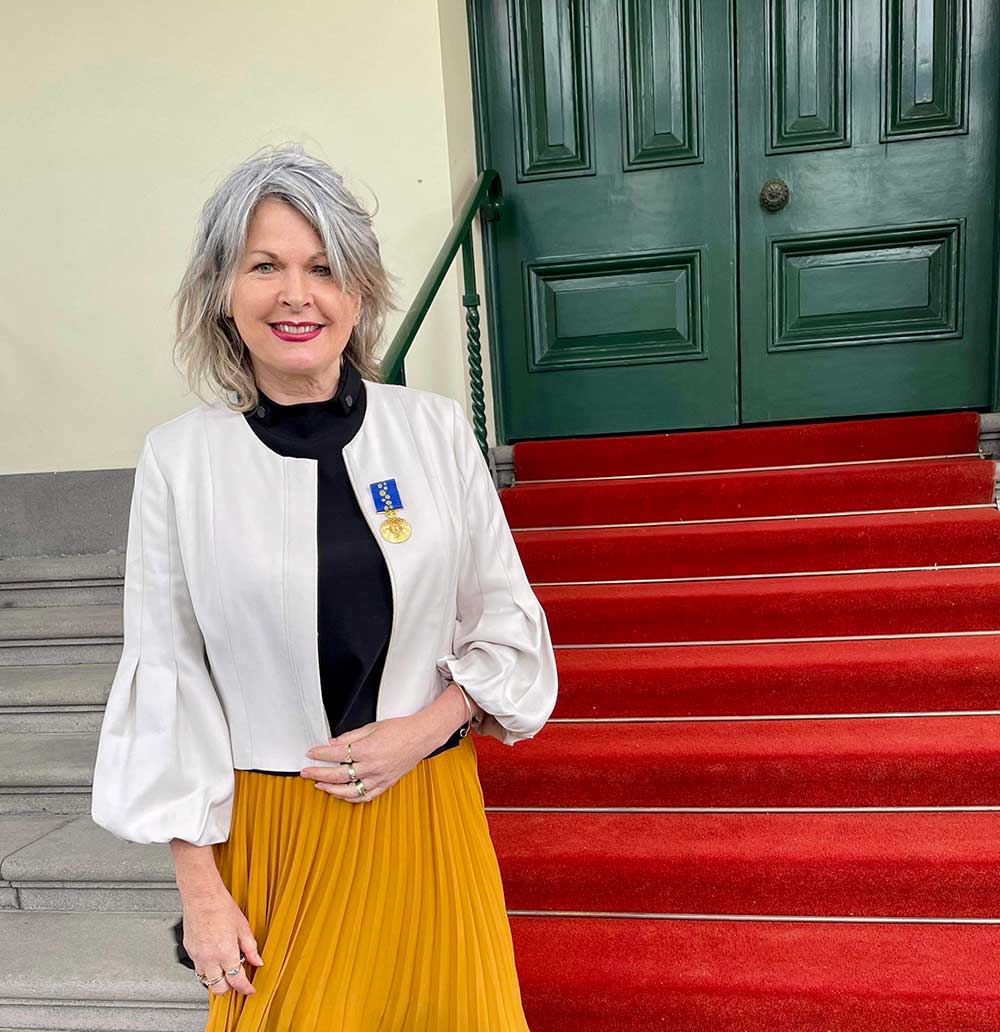Reshaping mindsets for a more inclusive sector

There is still a significant gap when it comes to the representation of women founders and women in senior leadership roles within the area of sports technology and innovation. ASTN’s Women in Sport Innovation report aims to shine a spotlight on this issue, as well as celebrate the individuals that are driving industry change and helping to pave the way for a more inclusive and diverse sportstech sector.
Amy Crosland, Chief Operating Officer, ASTN speaks with Karen Pearce, OAM, Executive Manager Equity, Growth and Inclusion, Football Victoria. Pearce has had over 25 years of experience championing diversity, equity and inclusion (DEI) in sport and was awarded an Order of Australia Medal (OAM) in 2021 for her services to sport administration. The discussion highlights the importance of increased representation of women in senior leadership roles, and reinforces that gender equity requires strong leadership and committed allies.
AC: Can you share a bit about your journey in the sports industry, and what inspired you to pursue a career in the sector?
KP: My career in sports administration was a simple transition, brought about by my love of basketball. I had played from a young age, volunteered on numerous committees, and became President of a local basketball association while juggling my most treasured 'full-time role’ as a stay-at-home Mum of four when I was asked to fill a position for three months at Basketball Victoria. This turned into a career in basketball spanning nearly 20 years. In 2019 I moved to Football Victoria, continuing to work in the DEI space with a focus on driving equity. The early days of dabbling in DEI, teaching myself to understand the philosophy, and developing the principles and the practice to enable access and drive growth outcomes led to a career in sport driven from the heart. It has and remains today an absolute privilege to work in this industry and I wouldn’t have it any other way.
AC: Is there a particular initiative/s or project/s that you have been involved in that has contributed to the growth of women's participation in the industry?
KP: Football is traditionally a male dominant sport, predominantly driven through cultural ties and historical beliefs that have contributed to a critical gender disparity over many decades. While sport commonly focuses on driving greater playing opportunities to bring more women and girls to the game, Football Victoria's bold objective of 50:50 gender equity by 2027, has led us to highlight the gender disparity across all facets of the game.
Our Change Makers project is a partnership between Football Victoria (FV), Victoria University (VU) and Regional Sport Victoria. The project builds on the strong relationship forged between FV and VU who have been successfully working together since 2019 to address the gendered drivers of violence in football clubs.
Change Makers is underpinned by sociological research and pedagogical best practice and is focused on empowering community football clubs to analyse and transform gendered inequities within their own contexts. It is an innovative, sector-leading model for change designed to support clubs to navigate their own multiple forms of intersectional gendered biases in football that lead to social inequalities through a series of tailored workshops and dedicated on-site support.
We know that working alongside our clubs will lessen the likelihood of apathy, complacency, and gender fatigue and instead, shift attitudes and drive change. Identifying allies (people and clubs) enables a strategic focus to move the 'moveable middle' so change can effectively begin and prevent further resistance. Empowering our clubs to identify inequities and then plan for sustainable change is a testament to their commitment. The many clubs involved so far have seen tangible shifts in increased engagement of women and girls in various capacities which has been an absolute pleasure to witness.
AC: We know that there is a gender gap in sports administration and leadership roles. From your perspective, why is it crucial to have greater representation of women?
KP: Power structures are generally built around men's lives and stereotypical perceptions of women leaders such as being bossy and too tough. Strong leadership and committed champions (regardless of gender), attribute to an enabled environment particularly when women have a seat at the table and men support as allies.
When a leader cares about an issue, the rest of the organisation tends to follow. Embedding it into business will withstand leadership changes and focus on ensuring sustainability. For football, gender equality is multi-dimensional. It’s not only about the number of players on the pitch, but it also impacts our game as a collective. From internal biases and the dominance of the coaching fraternity to the severe lack of female referees, to the leaders in our game who sit in club boardrooms desperately striving to change mindsets towards a more inclusive sporting world.
For women, usual day-to-day burdens and commitments can often stifle ambition to learn more and lead. When combined with self-doubt and a lack of confidence, the result is a severe lack of women in leadership positions in sport. Globally we are seeing a greater shift towards the empowerment of women across all levels of society. Our responsibility is to provide greater access to our women, girls and gender diverse people to develop and thrive as leaders in football. Closing the gender gap has gained momentum, including supporting and increasing the number of women in boardrooms, but sadly, change remains slow leaving inequity at the fore.
We must make visible the gender discrimination and work hard to elevate the number of women as vital role models. The more diverse the voices, the better the decision making in leading the design and ongoing development and growth of not only football, but society in general.
AC: What advice do you have for aspiring women looking to enter the sports industry/sports innovation space? Are there specific skills or attributes you believe are essential for success?
KP: Sport has the capacity to enable access, growth, and development opportunities for all who wish to engage. The ability to influence the business model for required change is paramount to success. My advice is...
- Be ethical, resilient, influential, and empathetic.
- Understand multiple cultural frameworks, values, and norms to help break down the barriers.
- Be courageous by trusting in your own ability to challenge the status quo.
- Commit to continuous learning and improvement particularly in the areas of DEI.
- Role model inclusive and culturally competent behaviours at all times.
- Be conversant on best practice, emerging trends and apply these in a way that enhances business outcomes.
- Be able to discern when to inquire, advocate, drive or resolve decisively.
- Showcase your competencies, capabilities, and knowledge to effectively generate support.
- Embrace your abilities and choose to lead.
AC: Looking ahead to the Brisbane 2032 Olympic and Paralympic Games, how do you envision the role of women in sports innovation evolving in Australia?
KP: Connectivity between people and communities that provide much-needed physical and mental health and well-being outcomes was severely lacking during and post-COVID and impacted sporting clubs to a level never seen before by placing a burden on tired volunteers. Our emergence from the pandemic started slowly, but the ultimate success of the FIFA Women’s World Cup 2023™ has holistically reinvigorated sport and created a catalyst to actively drive DEI outcomes.
The current boom in women’s sport is creating much-needed conversation that defines women as strong, resilient, and authentic leaders. It has opened the opportunity for more people to be involved in a manner they wish. In simple terms and to further support our women, girls and gender diverse people in sport we must empower our volunteers with training to further increase their capability; continue to create new and innovative ways for all to participate; actively recruit, train and retain coaches and officials; develop our women and girl athletes to strengthen the green and gold Victorian runway; and build a network of community champions and ambassadors to promote the importance of sport and enhance intercultural knowledge and capacity to amplify voices.
However, we are currently the only sport responding to our inequity with primary prevention strategies. Equity is not just a football responsibility. We are all accountable for driving real progress but if we don’t understand intersectionality and its influence on access and development and embed it into our policies, structures, and practices with a primary prevention overlay we will not impact to the level society requires. We cannot revert to the ways of yesterday. We need to ride the wave of this success and continue to scale and ensure everyone is afforded the same opportunities, rights, and respect. Not just because it is the right thing to do, but because if we break the cycle and identify and change the dominant forms of masculinity, we will create a united, safe, and more inclusive society where we can all thrive.
Read the full interview series and download the ASTN Women in Sports Innovation Report.
